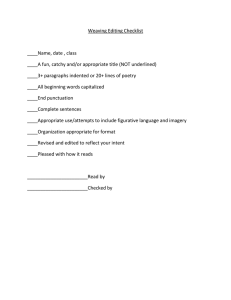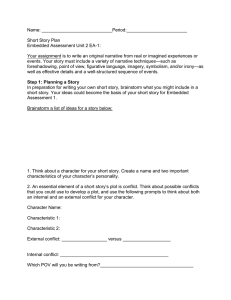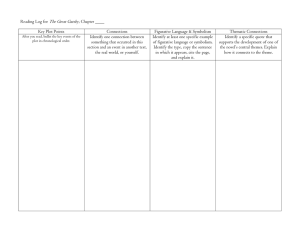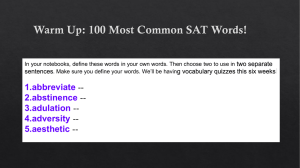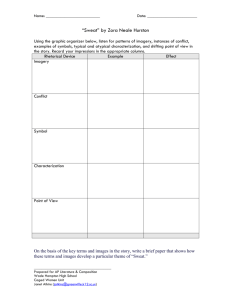Questions to Consider about Setting, Characterization, POV, Narrative Structure, and Imagery Figurative Language.
advertisement
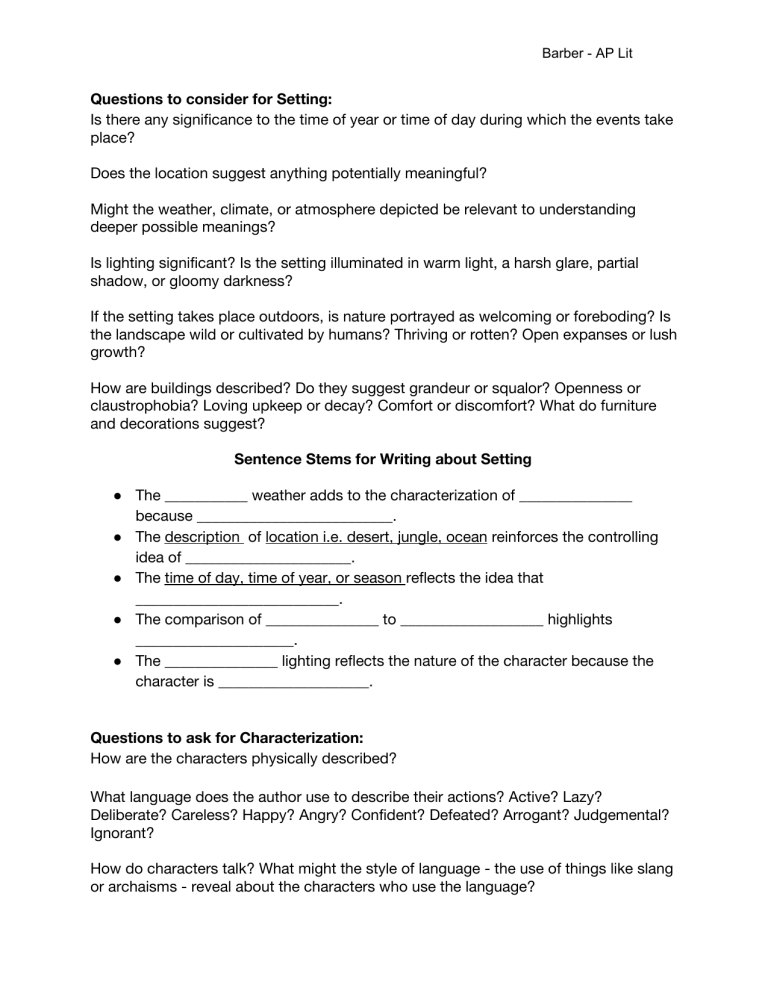
Barber - AP Lit Questions to consider for Setting: Is there any significance to the time of year or time of day during which the events take place? Does the location suggest anything potentially meaningful? Might the weather, climate, or atmosphere depicted be relevant to understanding deeper possible meanings? Is lighting significant? Is the setting illuminated in warm light, a harsh glare, partial shadow, or gloomy darkness? If the setting takes place outdoors, is nature portrayed as welcoming or foreboding? Is the landscape wild or cultivated by humans? Thriving or rotten? Open expanses or lush growth? How are buildings described? Do they suggest grandeur or squalor? Openness or claustrophobia? Loving upkeep or decay? Comfort or discomfort? What do furniture and decorations suggest? Sentence Stems for Writing about Setting ● The ___________ weather adds to the characterization of _______________ because __________________________. ● The description of location i.e. desert, jungle, ocean reinforces the controlling idea of ______________________. ● The time of day, time of year, or season reflects the idea that ___________________________. ● The comparison of _______________ to ___________________ highlights _____________________. ● The _______________ lighting reflects the nature of the character because the character is ____________________. Questions to ask for Characterization: How are the characters physically described? What language does the author use to describe their actions? Active? Lazy? Deliberate? Careless? Happy? Angry? Confident? Defeated? Arrogant? Judgemental? Ignorant? How do characters talk? What might the style of language - the use of things like slang or archaisms - reveal about the characters who use the language? Barber - AP Lit Might the names the author gave to characters hold some significance? What actions do the characters perform, particularly actions that seem contradictory or defy your expectations? Are there any contradictions to how characters behave or between how they think and act? Can you identify the nature of a conflict or conflicts that involve the character? What does a focus on the nature of internal conflicts reveal about the possible deeper meanings of the story? Sentence Stems for Writing about Character ● The character is driven by a motive of __________ which can be seen through _____________________________________________. ● The character’s conflict is one of ____________ which causes the character to react by __________________________. ● The character’s thoughts contradict the character’s actions as seen though ________________________________. This suggests that ___________. ● The character’s physical description leads one to believe the character is___________________. This matters because ____________________. ● __________________ and _____________________ contradict parts of this character. This shows ____________________________. ● The author portrays the character to be _______________, but the character is really _____________________. This is indicated by ___________________ and shows ____________________. ● The character’s words, thoughts, or actions drive the plot by________________. This shows _________________ about the character. Questions to Consider for Point of View What biases does the narrator or speaker have? How broad or limited is the narrator’s perspective? How do these limitations affect our understanding of events? Are their shifts in perspective? What contrasts can be observed in the different shifts? Why does the perspective highlight or reinforce the meaning of the text? What would the text lose if it were told from a different perspective? Barber - AP Lit Sentence Stems for Writing about Point of View ● The ______________ POV adds to the text by _________________. ● By having a(n) ______________ narrator, the author is able to emphasize ___________. ● The shift in perspective from _________ to ___________ adds to the text by _________. ● The _________ POV adds to/reinforces the controlling idea of the text by ____________. ● Without the __________POV the story loses the meaning of _______________. ● The __________ perspective provides insight into ____________ by _____________. Questions to Consider for Narrative Structure Is it chronological or non-linear? Why would the author choose to structure the story this way? How does this choice relate to the setting, characterization, or a controlling idea? (A chronological plot allows readers to move through the story focusing more on characterization and conflict. A non-linear plot creates a sense of confusion or disjointedness reinforcing either a character’s state of mind of a confusing or complex theme.) Are the order of events in the story aligned to the way the events actually happened? If not, why might the author choose this order? How specifically does conflict push the plot forward? Or not push the plot forward? Does the author use flashbacks or possibly flashforwards? (What do these add to the story not only in content but also in the reader’s emotions - i.e. suspense, frustration, confusion). If reading an excerpt, what does the beginning of the passage emphasize? Why might this be important? If reading an excerpt, why might the passage end where it does? Can this be used when writing a conclusion? Barber - AP Lit Sentence Stems for Writing about Structure ● The author uses a chronological plot structure to focus attention on ____________________ (a character, setting, or theme that relates to simplicity). ● The author employs a non-linear structure to place an emphasis on _____________ (an event, a character, or a complicated theme). ● The narrative arc of the story builds (slowly or quickly) to emphasize_______________ which shows___________________________. ● The author shifts the focus to ______________ by using (insert structural choice). ● The author uses flashback to focus the reader on _______________________. ● One of the themes of the passage is ____________________ which is reinforced through the author’s use of (structural choice). Questions to ask about Imagery/Figurative Language How does imagery/figurative language contribute to the mood of the text? What does the imagery/figurative language reveal about a character? What does the imagery/figurative language reveal about the setting? Is imagery/figurative language being used to foreshadow the plot? What connotative meaning does the imagery/figurative language provide that is not brought out in the literal meaning? Sentence Stems for Writing about Imagery/Figurative Language ● The (specific literary device) adds depth to the character by ________________________. ● The (controlling idea) of the passage is further explained by the (literary device) which shows ___________________. ● The (specific details of imagery) create a ______________tone which add to the theme by _______________________. ● The (specific simile/metaphor) adds meaning to the character/setting by comparing ______________ to ______________. This shows _______________________________ about the character/setting. ● By personifying _______________, the author is creating a sense of _________________. ● The (controlling idea) is further explained through the use of (literary device/imagery) which shows ___________________________. Some of the questions are from Digging into Literature (Wolfe and Wilder) as noted on the accompanying slides.
